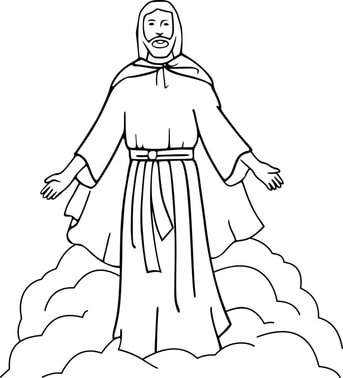 Kasey and Annie in 2005 on vacation in Oregon Kasey and Annie in 2005 on vacation in Oregon I did not think I could do spiritual direction without my dog. She had been there from the beginning with her soulful eyes. She knew when to sit on a directee's lap, cuddle up beside them, or stay on my lap looking and listening. Her presence and gaze was the topic of conversation during many spiritual direction appointments. "It's like she's looking into my soul!" one young seminary student exclaimed. "In my vision, it was your dog that helped me have courage and assured me that I would not fall into darkness; how did she know to come sit with me at just that moment?!" a stay-at-home mom said with wonder-filled eyes. When asked to sum up what God had been offering him through spiritual direction, the aerospace engineer who cultivated a Zen garden in his backyard, replied, "The image is Annie, your dog. God has shown me grace through her." My miniature dachshund and I were partners. So when faced with sitting with people by myself, I did not think I had what it took. I was convinced it would not be as powerful of an experience for people. I relayed my fears to Father Carl Arico while on a Contemplative Outreach retreat in Sewanee, Tennessee. And while he believed I would be just fine, he suggested I set out a photo so that she would continue to be with me during the time of spiritual direction. It was then that I understood how God had companioned me through her during my beginning stages of being a spiritual director. She had modeled ways of listening and discernment, showing me it was not about what I knew, or about any kind of performance, but how I was with people that mattered most. Through her, God had been present to me. Countless times since then I have met with people whose best (& many times only) experience of the unconditional love of God has come through their dogs. Because of my own experience of how a dog can be a vessel of the Divine, I pay special attention to the relationship people have with their pets. And I integrate this relationship into prayers and spiritual practices, because the love they give counts. So maybe you are one of the people who need to hear that the way your dog loves you is God loving you through your dog. If that's the case, a spiritual practice for you is spending more time with your dog! I know a woman who has three precious dogs, I call them her visible Trinity. Being with them is so life-giving, filling her with such love, that she is able to be in the world and interact with people differently than before the time with them. Her dogs usher her into the mind of Christ and is that not what the best spiritual practices do for us?  “The Tao which can be told is not the eternal Tao,” states the opening line of the Tao te Ching. Try replacing Tao (or Way) with God or Jesus. No matter who we are, the image of the Way, of God, even of Jesus, that we hold is not the true or eternal one. Our image will never offer the whole picture or truth. A book that is an enjoyable reminder of this is Naming the Unnameable: 89 Wonderful and Useful Names for God …Including the Unnameable God. So even though God is beyond all images, why do I still often ask people in Spiritual Direction, “When you pray or think about God, how do you image God?” You can learn a lot from the image of God you hold. Images are powerful. As a Spiritual Director, they can let me know why a person may have such a hard time being in Silence, praying, or trusting the Sacred Presence. They can also help identify particular spiritual wounds. Some images we hold inspire fear and shame rather than love and trust. An example from my work: Most often people describe a masculine image of God (usually a Zeus-like one standing judgmentally outside of them). This is not surprising as religions are chiefly shaped in and by patriarchal culture and language. Yet one may not (or may not feel the freedom to) stop to think how a strictly masculine image of God can be wounding. Women, especially, have suffered (the extent is a topic for another time). But all of Creation (as well as Creator) suffers when parts of them (and in this case, the feminine) is ignored, suppressed, or even despised. For some, the suffering leads to feelings of resistance to all things around God, Jesus, Church, and Scripture. Not knowing the soul is crying out for a more holistic, truer image of Divinity, many times the person feels guilty or rejects all things religion-related (but somehow some still find their way to sitting with a Spiritual Director!). As we listen together in the Silence, the still, small Voice begins to whisper of the Divine Feminine and often images from Scripture itself arise—Lady Wisdom (also known as “Chokmah” in Hebrew or “Sophia” in Greek), Mother Hen gathering her chicks, Mother God holding or nursing her beloved child, Mother Mary who knows suffering... Notice the “Mother” theme? It is both telling as to what the person’s soul is crying out for as well as a needed corrective for an overabundance of Father imagery. Feel uncomfortable with that thought? You are not alone, fear can often accompany the idea of turning toward these images (it did for me!). After all, a patriarchal culture only validates patriarchal images! Isn’t it amazing these feminine images are to be found at all in the Hebrew and Christian Bible? And by the way, Saint Paul declares Jesus to be the embodiment of Sophia (see I Corinthians 2:7 as one example). When those in Spiritual Direction allow themselves to embrace (or be embraced by) the Divine Feminine, guess what? They can pray again. And they begin to trust in the God who is with them, and in the case of women, a God who resembles and better understands them. They discover a true Soul Friend. An example from home: My teen daughter is a contemplative at heart. Silence has been her way of prayer since she was tiny. And for just as long, she has expressed a disdain for overly masculine images of God. We have talked about Mother God since preschool when we tweaked her school's "God our Father" singing prayer to also include "God our Mother." But not seeing or hearing the same language in communal worship has left her with little desire for institutional religion. I cannot blame her. While it has not been a cause for worry, I have wondered if Silence is more of an escape from religion or a hiding place from the world rather than a surrendering to the Sacred. Regardless, I have trusted God would meet her in it, even if I had no idea of the particulars. But the other day she surprised me by saying she talks to Lady Wisdom and asks for Her help all the time! I guess she figured one mother is enough for now! She has found relating to God as Lady Wisdom to naturally be more soul friendly. And finding a Friend of her Soul, she cannot help but pray.  Years ago, I read George MacDonald’s 1879 novel, The Baronet's Song (also titled, Wee Sir Gibbie). It’s about a young, mute, Scottish boy raised, then orphaned, by an abusive, alcoholic father. Gibbie finally ends up being adopted by an elderly couple and the old woman, Janet, becomes a mentor to the pure-in-heart boy. Seeing the face of Jesus in him, she teaches him everything she has ever loved about Jesus (which was very different than the hellfire and brimstone being preached in the churches!). Writes MacDonald, "So teaching him only that which she loved, not that which she had been taught, Janet read to Gibbie of Jesus and talked to him of Jesus, until at length his whole soul was filled with the Man, of His doings, of His words, of His thoughts, of His life. Almost before he knew, he was trying to fashion his life after the Master. Janet had no inclination to trouble her own head, or Gibbie's heart, with what men call the plan of salvation. It was enough to her to find that he followed her Master." Prayers of salvation and baptism (so he would not go to hell) were of no concern to Janet. She simply shared with him the life of the One who taught her how to walk in the way that leads to Life. I finished that novel and began reading more novels of George MacDonald's, The Curate's Awakening, The Musician's Quest, The Lady's Confession, The Poet's Homecoming, The Fisherman's Lady, The Marquis' Secret and more...amazed at the way his characters experienced and trusted in (& their lives reflected) an unrelentingly kind and tender God. Each time I would say to myself, "I want to trust God and speak of Jesus in that way." And slowly like Janet had done for Gibbie, George MacDonald did for me. Sometimes what we have been taught or picked up on in regard to salvation does not lead to the freedom or life of which Jesus spoke. It does not cause the heart to long to know and trust that God more. Says Meister Eckhart in Daniel Ladinsky's Love Poems from God, "How long will grown men and women in this world When you think of God, does the image that comes to your mind make you sad or fearful?
Or is it an image your heart dearly loves? If you prayed the prayer of salvation or were baptized, what was that like for you? What motivated you to do so? A welcome into and communal acknowledgement of following Jesus on the path of Life? Or wanting to be saved from hell and eternal punishment? If both rituals initiated you into living a life of Love, I am so very glad for you (my baptism was very meaningful to me). But if either were fear-motivated, perhaps it is time to recognize any grasp it still has on you, especially if fear-based theology continues hissing in your ear. Stories around salvation and baptism reverberate throughout one's life, for better or for worse. And fear-based theology can offer nothing (no matter how convincing!) but fear-based lenses to view one's self and the world. Maybe it's time for a trip to the library to spend time with George MacDonald's characters. Maybe it's time to come to Spiritual Direction and experience the God of Wee Sir Gibbie. Maybe it's time to pick up your crayon and draw a different image in your coloring book.  We all experience the "voice" of the Sacred Presence. Whether or not we pay attention or correctly identify it requires ongoing discernment. One thing is for certain, it's hard when you're hangry (hungry + angry)! On Sunday mornings, my family spends a little time in guided prayer. We often get ideas from Imaginative Prayer for Youth Ministry: A Guide to Transforming Your Students' Spiritual Lives into Journey, Adventure, and Encounter by Jeannie Oestreicher and Larry Warner (I'd use this resource even if I didn't have kids!). The past two weeks, we were "present" in the desert with the exhausted Elijah who needed to rest and eat. Then we were with Elijah again as he experienced God's voice. We, too, received God's invitation to rest and eat in the desert as well as recognized God's voice as we stood beside Elijah on the mountain. After some time in silent reflection, we share what we experienced. I'll share mine. "What are you doing here?" is the question Elijah hears God say to him in I Kings 19:13, twice. As I stood at the mouth of the cave on the mountain in my mind's eye, I realized the power of gentleness through that question. It took me a while, though. The first time, I felt criticized. Tone matters. How we hear God's question to us reveals our current condition, our image of God, and how we interpret and then respond to the question. When I am exhausted, I can hear things in a particular way that perhaps the speaker never intended. I can also miss things the person intended me to hear. My response often reflects my tone deafness. My husband and kids can attest to this! Only after resting and eating, did Elijah have the strength and ability to look, listen, and recognize God's response to his complaint. In Chapter 19 of the book of I Kings in the Hebrew Scriptures (Old Testament of the Bible), we're told that God had Elijah go stand on the mountain and watch for the Lord. A whirlwind, earthquake, and fire came and Elijah did not recognize God in them. It was in what followed the fire...a gentle whisper (the sound of sheer silence some translations say)...that Elijah recognized the voice of God. And God asked Elijah for the second time, "What are you doing here?" The second time, I became curious as to how we were all hearing it in our imaginations. I had my family try something after the time in silence. You can try it, too:
For me, the question changed completely! It went from a judgmental, accusing, you-should-be-doing-more tone, to one of care and concern. The voice in the whisper reminded me of the caring words and actions of the angel of the Lord who had offered much needed rest and food to Elijah forty days earlier. And this reminded me of how the gentle whisper of God never fails to silence my inner critic and relax my body. I no longer feel the urgent need to run and hide (or get compulsively busy). When I listen to the still, small voice, I am ready to hear more-- even if that more is something that in a hangry moment I would not be open to hearing. Like, "What are you doing here?" which could be literal (in this physical place) or metaphorical (in this place in your life). God (& my family) knows that after food and rest, I am ready for an honest conversation! ____________________________
“Must be hard being 10 and already going through dark night of the soul,” 14-year-old, Lainey, said as the two of us drove back from her fencing lessons. Her comment about her brother caught me off guard. As a Spiritual Director, I companion adults going through Dark Night of the Soul, but I had not considered how children may, too. I know that children suffer depression which in adults can coincide with Dark Night, but I had not seen Dark Night through a child’s eyes (even though our most memorable moments with God often happen when we are children). For those not familiar with the concept, Dark Night is a stage in the spiritual journey that Saint John of the Cross experienced and wrote about in the 16th century. He gave words to the “spiritual crisis” that occurs for those seeking union with God or to embody Perfect Love. Whether happening gradually or initiated through a tragedy or hardship, Dark Night can be felt as emptiness and dryness. Our go-to spiritual practices no longer “work.” Those activities and places of belonging that once brought us enjoyment, no longer do so. We suffer disappointment, doubt, disorientation, discomfort, disillusionment, and even the utter disintegration of our thoughts and feelings about God, ourselves, and life. In experiencing this loss and grief, depression can occur. We ask questions like, “Who am I?” “Who and where is God?” “What’s going on?” “Why can’t things go back to ‘normal’?” “What is normal anyway?” “Will this ever end?” This liminal space is entered into many times in our lives as we find ourselves in places and situations we would rather not be (like in a pandemic!). We are in that “in-between” of who we were before and who will be after…it’s definitely uncomfortable. My 10-year-old joins the rest of the planet in this communal Dark Night of the Soul. He’s asking, “Who am I?” “Who are my friends?” “Do I even have friends anymore?” “Will friends recognize me when I do go back to school?” “Is virtual school even school?” “Will I ever play baseball or basketball again?” “Will I even love sports again?” “Things are too stressful in the world right now, is it always going to be like this?” Now here’s what makes Dark Night different from depression. When depressed, it’s a good idea to seek counseling and/or receive medication which hopefully helps us emerge from the darkness of depression with great relief. And while there may be inner relief from the suffering (which is something to celebrate), there may not be inner transformation. One may be grateful to simply return to oneself. During a Dark Night, rather than seeking a way out of the darkness, we are led deeper into it (a Spiritual Director is really helpful in the dark!). This is the place where God loosens our attachments to all we may mistake for God, life, and our true selves. It can be painful to have these attachments revealed and painful to let go of them. After all, we might really love being known as the athlete, whether spiritual or baseball! We might cherish the feeling we get in imaging and relating to God in a certain way. However, when we emerge from Dark Night, we not only find relief but we are also transformed. We no longer see or exist in the world in the same way we did prior to the darkness. In other words, we do not return to ourselves, but are a new, truer Self! An expanded heart is the fruit of the Dark Night. We see God, ourselves, and the world in deeper and wider ways and we are free to love God, ourselves, and the world in deeper and wider ways. A different 14-year-old girl shared an image that came to her during our Girls’ Group-time of listening to the instrumental song, Unfolding. It offers a beautiful and striking image of what it’s like to come through Dark Night of the Soul: I saw a newborn fawn. The fawn had outgrown the only world it knew and she was witnessing the moment of it breaking free of the old and opening its eyes in the new one. As her words convey, the birth process is messy--so is being “born again” into a new way of being and seeing! This is my hope for our world. In the words of Matthew Fox, “A pandemic is a terrible thing to waste.”
In the meantime, we have the birth pains. Last night I talked with my son about his struggles and the possibility of counseling. With his permission, I share what he said: “Mom, I don’t think I need counseling right now, I have no problem discussing my feelings with you and Dad. And yeah, I’m learning new things about myself, but I’m mad and nothing helps. I hate sports right now. Lainey’s discovered a sport and mine are gone. I can't do anything right. I don’t know when it will end, maybe it never will. But I don’t need any other voices right now, what I need is you.” At 10, he’s being led deeper into the dark and I’m going to sit with him there, as a Spiritual Director and Mom. Together, in this womb-like darkness, we’ll wait and trust that the God we cannot see or feel, is truly Emmanuel, “God-with-us.”  As a Spiritual Director, I’m on the lookout for “fake Jesus.” Whether during the very first session or sometime later through conversation, Ignatian contemplation or other kinds of guided prayer, the Jesus that a person has internalized arises. Remember, a person doesn’t have to be a Christian to have an image of Jesus that dwells within them, impacting the way they think about or view anything Jesus-related. Our image of Jesus, like our image of God, matters. This image is often pieced together in childhood. Early paper cutouts with fuzzy backs stuck to flannel boards, the voice and actions of a parent, pastor, or Sunday School teacher, experiences in Vacation Bible School, childhood books and pictures... In fact, it appears that even the Gospel writers may have pieced together a “Jesus” that didn’t always align with the authentic Jesus. Stephen Mitchell in his book, The Gospel According to Jesus: A New Translation and Guide to His Essential Teachings for Believers and Unbelievers, reveals how the early church writers included not only words and actions that Jesus likely said and did (since he didn't write anything down himself), BUT they also included words and actions they and their community needed him to say or do to fit their own beliefs! If what “Jesus” says is in opposition to the authentic Jesus’ main teachings (especially loving God and your neighbor as yourself), there’s a good chance the writer is making Jesus in his own image. This same “making-Jesus-in-our-own-image” and having him align with our own beliefs is on blatant display this political season! Now rather than being threatened by Mitchell’s idea, I find it’s helpful in developing skills in discernment. Remember, Scripture is “living” which means it “speaks” to us as we wrestle with it (which is to join in the lineage of the literal name of Israel!). It changes as we change and grow. Try living with a particular text, a story, a single Scripture for a month and notice how it changes (& how it changes you)! There is no end to new and deeper insights. Back to our images of Jesus…these images are rarely questioned. When an internal voice is associated with Jesus, a person automatically thinks it’s Jesus! So rather than simply agreeing with them, I listen to the person describe their interaction (always keeping in the back of my mind Jesus’ authentic teachings and his nature as revealed by his authentic teachings). Sometimes I’ll hear them say things like “Jesus has to knock me upside my head to get my attention.” If during a guided prayer, a door or a place of darkness often appears, “Jesus” will tell them not to look or go through it, to only focus on the light. Curiosity is helpful here. I’ll ask, “Whose voice does Jesus’ remind you of?” or “Why don’t you go back into your imagination and simply observe Jesus for a moment, what do you see?” Every single time, there is surprise. The response is often: “My whole life I thought it was Jesus’ voice I was hearing but it was actually my father’s!” "Oh wow, now that I'm looking closer, He looks like a flannel board Jesus. Kind of flimsy, not able to open the door.” “Jesus doesn’t really have much substance, he’s ghost-like, but as I watch he’s becoming more human.” And when Jesus becomes more human, more of his authentic self, they experience His great tenderness and strength. In doing so, their own tenderness and strength is called forth. With this Jesus, they find they are able to open doors and enter into places of darkness they never thought they could. With this Jesus, they are able to love the parts of themselves and the people they never thought possible. In other words, in coming in contact with the authentic Jesus, they are able to love their neighbor as they love themselves!  It's the first day of middle school for my daughter. In June, a handful of 6th grade girls met in my living room for their first summer prayer group. The practice I had picked out for them was a prayer inviting them to receive God's love through the person who loves them most (I wrote about the practice in an earlier post). When they closed their eyes, I told them to bring a person who loves them most to mind and consider what special gift that person offers them. Then after they silently expressed gratitude for that person, I asked them if they could receive that this person is a "face of God." And the way this person loves them is the very way God was offering them love right that moment! After a few more moments in silence, they spent some time journaling and then we opened the time for sharing. Guess what? The special gift of the people that came to each of their minds was the same! This should offer us some insight. What was the gift? How was God wanting to love them? Through playfulness and humor! Was this your image of God in middle school? Is this part of your image of God now? Yet it is the very image that God, the Originator of Playfulness and Creator of Humor, wanted to share with them. It makes sense too, doesn't it? They (and their parents) will need tons of playfulness and a life-giving sense of humor as they enter and seek to survive middle school! And on this morning, God has not disappointed. The person my daughter brought to mind in June, her little brother, had her giggling with his silliness and the way he accidentally swapped words around when he said, "The mow looks perfectly yarded!" She laughed all the way to the bus stop. I could not have asked for a better way to begin her first day of middle school. It was the perfect reminder to her nervous parents that the playful, humorous God was near.
 More than I thought. In 2009 I had emergency back surgery for a ruptured disc that caused the worst nerve pain I have ever felt...paralyzing lightning down my leg and out my right toes leaving me screaming. After the surgery, I'd hoped the muscle pain and sciatica I had experienced on and off since high school would finally be gone...it wasn't. I did physical therapy (having already done chiropractic). Again I was hopeful...it didn't help. Whenever the pain would hit, I'd chalk it up to accidentally bending or twisting and tweaking an old basketball injury. It would have me either in bed or on the floor with my feet up on the couch for days. I thought my active life of hiking and carrying stuff (like my own little girl) was over. I (& those around me) started treating my back gingerly, making sure I did not lift or do anything that could trigger that familiar shooting pain. You can imagine what I looked like whenever I walked and sat down or did anything that included my back (amazing how much does!). One night at a breathwork class, after observing me, the instructor told me to read John Sarno's The Mindbody Prescription, saying it would help. I thought this was laughable. I'd undergone the knife and physical therapy, how could a book help? Undeterred she told me how it had helped a friend with my kind of pain. At the end of our time she said, "You're so young, I just don't want you to be in pain the rest of your life." What did I have to lose? I read it. I haven't been on the floor or in bed due to back pain since. Seriously. That was 8 years ago! Over the past eight years, beginning with that book, I've learned three things: My physical self is interconnected with all other parts of myself. How I am spiritually affects how I am emotionally which affects how I am physically and all can affect how I am relationally. What's happening relationally can affect how I am mentally and emotionally and physically and so on. If we choose to dissect and isolate any of these when we have dis-ease or pain in any given area, we miss ways of healing that come when we consider the whole of us. A lifetime of being a "good girl" coupled with perfectionism affected my body. It led to the suppression of anger and other unwanted feelings which finally erupted in physical pain. My unconscious thought physical pain a better choice than emotional pain. Locating an old area of injury and a socially acceptable place of pain (back pain is what ulcers used to be!), that's what it chose. It's interesting the games our minds can play (thinking that they're helping us)! Seeing God as a Divine Task-Master perpetuated my good girl-perfectionist cycle. Since we become like the God we adore (as I mentioned in last week's post), my inner critics had no problem replicating this God-like perpetual drivenness to accomplish and improve. Be better. Try harder. Be (or at least act) perfect. And it's no surprise that snippets of Scripture would often run through my mind to back up these "commands"! Anytime I fell short, which of course I did since I'm human, I took the feelings of anger and shame and stuffed them. Eventually my body would no longer "play these reindeer games" (it began warning me in junior high but it took me a long time before I would or knew how to listen!). Now my body is my friend. I view it as part of the whole. It tells me the truth. When I feel nerve pain begin in my toe, I know that if I don't tend to what feelings are running under the surface, it will soon start in my back. My God-created body has invited me to not only reflect on my God-created emotions but even my image of God. As my image of God has undergone healing and transformation, guess what? It's affected my mind, emotions, relationships, and yes, my body. Thank God for that gift of back pain. |
AuthorKasey is a scarf, ball and club juggling spiritual director just outside of Nashville, TN. Play helps her Type-A, Enneagram 1 personality relax, creating space for poetry and other words to emerge. She also likes playing with theological ideas like perichoresis, and all the ways we're invited into this Triune dance. Archives
January 2024
Categories
All
|
By clicking “Sign up for E-News” I consent to the collection and secure storage of this data as described in the Privacy Policy. The information provided on this form will be used to provide me with updates and marketing. I understand that I may modify or delete my data at any time.

 RSS Feed
RSS Feed

